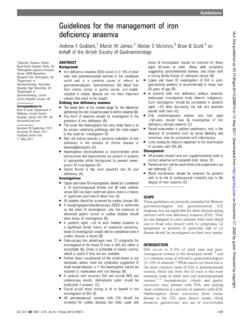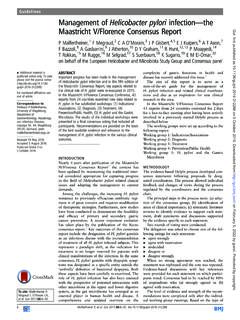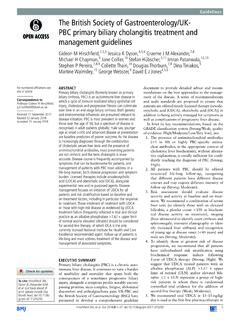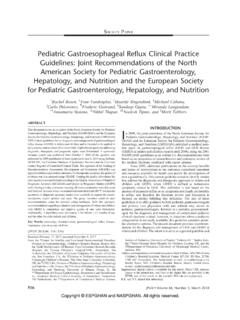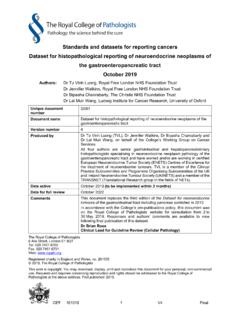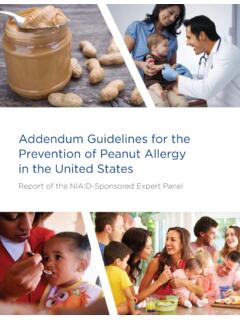Transcription of British Society of Gastroenterology guidelines on the ...
1 1 Vasant DH, et al. Gut 2021;0:1 27. Society of Gastroenterology guidelines on the management of irritable bowel syndromeDipesh H Vasant ,1,2 Peter A Paine,3 Christopher J Black ,4 Lesley A Houghton ,5,6 Hazel A Everitt,7 Maura Corsetti,8 Anurag Agrawal,9 Imran Aziz ,10 Adam D Farmer,11,12 Maria P Eugenicos,13 Rona Moss- Morris,14 Yan Yiannakou,15 Alexander C Ford 16To cite: Vasant DH, Paine PA, Black CJ, et al. Gut Epub ahead of print: [please include Day Month Year]. Additional supplemental material is published online only. To view, please visit the journal online (http:// dx. doi. org/ 10. 1136/ gutjnl- 2021- 324598).For numbered affiliations see end of toProfessor Alexander C Ford, Leeds Gastroenterology Institute, St James s University Hospital, Leeds, UK; alexf12399@ yahoo. comDHV and PAP are joint first 6 March 2021 Revised 30 March 2021 Accepted 6 April 2021 Author(s) (or their employer(s)) 2021.
2 No commercial re- use. See rights and permissions. Published by bowel syndrome (IBS) remains one of the most common gastrointestinal disorders seen by clinicians in both primary and secondary care. Since publication of the last British Society of Gastroenterology (BSG) guideline in 2007, substantial advances have been made in understanding its complex pathophysiology, resulting in its re- classification as a disorder of gut- brain interaction, rather than a functional gastrointestinal disorder. Moreover, there has been a considerable amount of new evidence published concerning the diagnosis, investigation and management of IBS. The primary aim of this guideline, commissioned by the BSG, is to review and summarise the current evidence to inform and guide clinical practice, by providing a practical framework for evidence- based management of patients. One of the strengths of this guideline is that the recommendations for treatment are based on evidence derived from a comprehensive search of the medical literature, which was used to inform an update of a series of trial- based and network meta- analyses assessing the efficacy of dietary, pharmacological and psychological therapies in treating IBS.
3 Specific recommendations have been made according to the Grading of Recommendations Assessment, Development and Evaluation system, summarising both the strength of the recommendations and the overall quality of evidence. Finally, this guideline identifies novel treatments that are in development, as well as highlighting areas of unmet need for future SUMMARY OF RECOMMENDATIONSD octor-patient communication Establishing an effective doctor- patient rela-tionship and a shared understanding is key to the management of IBS. Such a relationship can lead to improved quality of life and symptoms, reduce healthcare visits and enhance adherence to treatment (recommendation: strong, quality of evidence: low). Patients with IBS would like increased empathy, support and information from clinicians about the nature of the condition, diagnosis and symptom management options (recommenda-tion: strong, quality of evidence: low).
4 Diagnosis, investigation and education The National Institute for Health and Care Excellence guideline definition of IBS (abdominal pain or discomfort, in association with altered bowel habit, for at least 6 months, in the absence of alarm symptoms or signs) is more pragmatic and may be more applicable to patients with IBS in primary care than diagnostic criteria derived from patients in secondary care, such as the Rome IV criteria (recommendation: weak, quality of evidence: low). All patients presenting with symptoms of IBS for the first time in primary care should have a full blood count, C reactive protein or eryth-rocyte sedimentation rate, coeliac serology and, in patients <45 years of age with diar-rhoea, a faecal calprotectin to exclude inflam-matory bowel disease. Local and national guidelines for colorectal and ovarian cancer screening should be followed, where indicated (recommendation: strong, quality of evidence: moderate).
5 Clinicians should make a positive diagnosis of IBS based on symptoms, in the absence of alarm symptoms or signs, and abnormalities on simple blood and stool tests (recommendation: strong, quality of evidence: moderate). Referral to Gastroenterology in secondary care is warranted where there is diagnostic doubt, in patients with symptoms that are severe, or refractory to first- line treatments, or where the individual patient requests a specialist opinion (recommendation: weak, quality of evidence: low). There is no role for colonoscopy in IBS, other than in those with alarm symptoms or signs, or those with symptoms suggestive of IBS with diarrhoea who have atypical features and/or relevant risk factors that increase the likelihood of them having microscopic colitis (female sex, age 50 years, coexistent autoimmune disease, nocturnal or severe, watery, diarrhoea, dura-tion of diarrhoea <12 months, weight loss or use of potential precipitating drugs including non- steroidal anti- inflammatory drugs, proton pump inhibitors, etc) (recommendation: strong, quality of evidence: moderate).
6 In those with symptoms suggestive of IBS with diarrhoea, but with atypical features such as nocturnal diarrhoea, or a prior cholecystec-tomy, 23- seleno-25- homotaurocholic acid scanning or serum 7 -hydroxy-4- cholesten-3- one should be considered to exclude bile acid on May 18, 2022 by guest. Protected by : first published as on 26 April 2021. Downloaded from 2 Vasant DH, et al. Gut 2021;0:1 27. (recommendation: strong, quality of evidence: low). In patients with IBS and coexisting symptoms suggestive of a defaecatory disorder or faecal incontinence, anorectal physiology tests can be considered, where available, to select those who might benefit from biofeedback (recommenda-tion: weak, quality of evidence: low). There is no role for testing for exocrine pancreatic insuf-ficiency, or for hydrogen breath testing to rule out small intestinal bacterial overgrowth or carbohydrate intolerance, in patients with typical IBS symptoms (recommendation: strong, quality of evidence: weak).
7 The diagnosis of IBS, its underlying pathophysiology and the natural history of the condition, including common symptom triggers, should be explained to the patient. This should introduce the concept of IBS as a disorder of gut- brain interaction, together with a simple account of the gut- brain axis and how this is impacted by diet, stress, cognitive, behavioural and emotional responses to symptoms, and postinfective changes (recommendation: strong, quality of evidence: weak).First-line treatments All patients with IBS should be advised to take regular exer-cise (recommendation: strong, quality of evidence: weak). First- line dietary advice should be offered to all patients with IBS (recommendation: strong, quality of evidence: weak). Food elimination diets based on IgG antibodies are not recommended in patients with IBS (recommendation: strong, quality of evidence: moderate).
8 Soluble fibre, such as ispaghula, is an effective treatment for global symptoms and abdominal pain in IBS, but insol-uble fibre (eg, wheat bran) should be avoided as it may exacerbate symptoms. Soluble fibre should be commenced at a low dose (3 4 g/day) and built up gradually to avoid bloating (recommendation: strong; quality of evidence: moderate). A diet low in fermentable oligosaccharides, disaccharides and monosaccharides and polyols, as a second- line dietary therapy, is an effective treatment for global symptoms and abdominal pain in IBS, but its implementation should be supervised by a trained dietitian and fermentable oligosac-charides, disaccharides and monosaccharides and polyols should be reintroduced according to tolerance (recommen-dation: weak, quality of evidence very low). A gluten- free diet is not recommended in IBS (recommenda-tion: weak, quality of evidence very low).
9 Probiotics, as a group, may be an effective treatment for global symptoms and abdominal pain in IBS, but it is not possible to recommend a specific species or strain. It is reasonable to advise patients wishing to try probiotics to take them for up to 12 weeks, and to discontinue them if there is no improvement in symptoms (recommendation: weak, quality of evidence: very low). Loperamide may be an effective treatment for diarrhoea in IBS. However, abdominal pain, bloating, nausea and consti-pation are common, and may limit tolerability. Titrating the dose carefully may avoid this (recommendation: strong; quality of evidence: very low). Certain antispasmodics may be an effective treatment for global symptoms and abdominal pain in IBS. Dry mouth, visual disturbance and dizziness are common side effects (recommendation: weak, quality of evidence: very low).
10 Peppermint oil may be an effective treatment for global symptoms and abdominal pain in IBS. Gastro- oesophageal reflux is a common side effect (recommendation: weak, quality of evidence: very low). Polyethylene glycol may be an effective treatment for consti-pation in IBS. Abdominal pain is a common side effect (recommendation: weak; quality of evidence: very low).Second-line treatments Tricyclic antidepressants used as gut- brain neuromodulators are an effective second- line drug for global symptoms and abdominal pain in IBS. They can be initiated in primary or secondary care, but careful explanation as to the rationale for their use is required, and patients should be counselled about their side- effect profile. They should be commenced at a low dose (eg, 10 mg amitriptyline once a day) and titrated slowly to a maximum of 30 50 mg once a day (recommen-dation: strong, quality of evidence: moderate).



